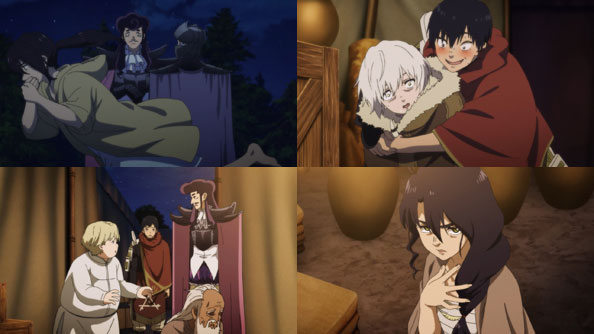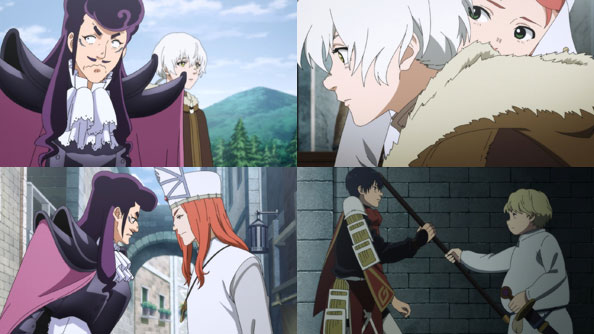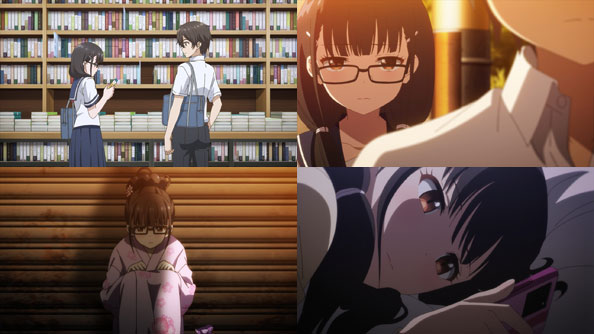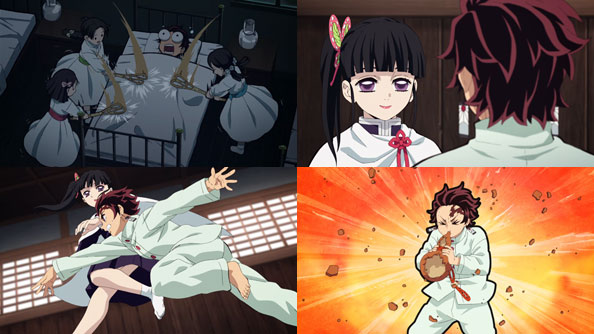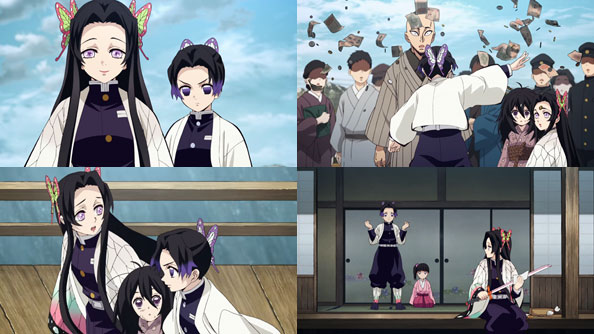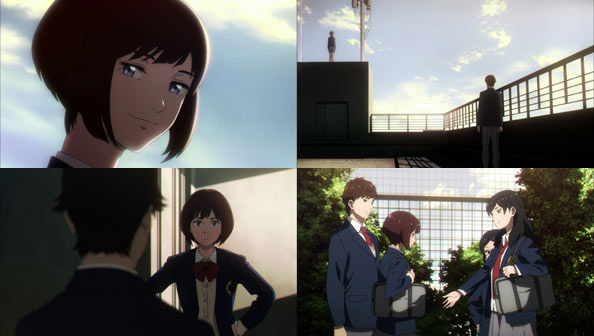
“Life is pain, highness. Anyone who says differently is selling something.”—The Dread Pirate Roberts
It’s Rika’s birthday. On one level, that’s a good thing: a cause to celebrate with her new friends, while also celebrating Ai’s retirement from shut-in-dom. Ai describes her sudden change of heart as having realized beating herself up at home wouldn’t solve anything.
On another level, Rika’s birthday also a reminder that she is one year older, one year closer to possibly becoming her lonely, alcoholic mom, and no closer to learning who her father was. Her mom agreed to tell her when she got into middle school, but she doesn’t know herself, and gives her five possible candidates. It could be one of them or none of them.
It’s instructive that Rika lives above a bar her mom owns. That bar has not only been the place where her mom no doubt met these many men over the years to try to quell her loneliness (and drown it in booze when she failed) but before Rika could enter her home she always had to walk past a gauntlet of drunk men.
Rika takes her birthday celebration as a chance to air some grievances, albeit with her usual irreverent tone that implies she doesn’t care. In truth, meeting her real dad is almost all she cares about. She believes her mother never wants her to meet him, since they might get along.

She calls her mom a “tragic heroine with a persecution complex” who has never apologized for anything and has nothing but her own pride. She thinks her mom believes she could have been happy if only she didn’t have her. Neiru, ever calm and logical and correct, asks rather tactlessly if Rika hates her mom too, and if “that’s what they call co-dependence.”
This angers Rika, who storms off, but she fully expects Ai to chase her, and she does. Ai is ready to continue the mom-insulting session, calling the two of them the “Single-Mother Girls”. As they wander the abandoned entertainment center and Rika swings and misses at the batting cages, “Serious Rika” comes out of her shell to talk about all the bad stuff that she remembered at once. As Ai listens, Rika wonders what the hell is even up with adults, who presumably bang and marry because they like it, yet end up like her mom.
Neiru and Momoe are worried about Rika, but when they hear her yell they’re confident she’s okay. Neiru wonders whether she’s too honest and direct for “female society”, but Momoe tells her she’s fine that way, as she hates when everyone pretends to agree. Neiru cops to being a straight-up orphan who never knew either parent, and notes it seems to have spared her “a lot of trouble.”
On the rooftop, Rika asks Ai about her dad, who she sees at least once a month, and thus is still her daddy even though her parents broke up. Rika can’t even remember her dad’s face—only his gentle voice when he once told her “a beautiful woman never needs a wallet.” After shedding a few tears of frustration from wanting to see him and not being able to, Rika declares “Moping Time” over and takes off.

The episode then shifts between Rika’s latest Wonder Egg battle and the battle she fights every day by having to cross a gauntlet of drunk men and her mom to gain access to her home. This Egg Girl and her family were members of a suicide cult, but still loves her Wonder Killer and wants Rika to join them in cosmic bliss.
She gives Rika the hard sell, telling her how her family was cursed by karma from their past lives, so they abandoned their attachments to the physical world. The Wonder Killer, whom the girl calls “the teacher”, talks of a flawed world “fixated on worthless appearances and hierarchies” in which the haves grow arrogant and the have-nots envious.
Once up in her dark room, Rika pulls out her box-cutter and draws it close to her arm. In the battle, the Egg Girl notices the sleeve on Rika’s arm covering her scars and tells her to “erase herself”, revealing more of the same scars on her own arm as a show of solidarity. The Egg Girl was once like her, hating, envying, and drowning in pain and despair, before becoming one with the teacher and becoming part of a “vast energy.”
Normally Rika might not be so easily taken in by this new age gobbledygook from the child of parents who bought into what someone was selling, but it’s her birthday, and “all the bad stuff” is still foremost on her mind. The pain of still not knowing her dad, the fear of becoming just like her mom; they weigh on her, and the Egg Girl and teacher’s offer to “erase her karma” sounds like a good one in the there and then.

In this psychologically vulnerable state, the Egg Girl and Wonder Killer are tag teaming her towards her doom. Aca and Ura-Aca even worry that they could lose her. Ai, Momoe and Neiru, sensing she’s in trouble, use their pendants to snap Rika out of it, but their voices fade out as the Wonder Killer tells her to relax and surrender herself to his “hug of life.”
The only thing that saves Rika from oblivion is the fact she too is a mother; a fact she’d forgotten in the haze of the cult proselytization. Her turtle guardian-child, Mannen, grows to full size and blocks the Killer’s hug, saving Rika. She realizes because he imprinted on her, he thinks she’s his mom, and that she almost turned into a “selfish, piece-of-shit” mother by giving up and abandoning her child.

Declaring death to all fake men who ask women for money, and partners with Mannen to give the teacher the “slice of death.” The Egg Girl is devastated, asking why Rika, who like her cut her own arm to endure the pain of life, turned down a chance at sweet release. But Rika wasn’t buying what the teacher was selling. Dying isn’t the answer; not for her. Even if it means hurting herself, she’s going to live.

Rika reunites with her extremely worried and relieved friends. Neiru doesn’t join in the group hug but makes it clear she’s glad Rika is okay. Later that night Rika goes downstairs, after the bar has closed, where her mom is where she always is, drinking herself to sleep. Rika takes the cake out of the fridge and has a bite, confirming her mom’s worry the cream has dried out.
Her mom laments having gotten “old” before she knew it. Rika points out she’s only 40, and her mom corrects her; she’s 38. She says she’s sure Rika will abandon her, too. Rika concurs, but after a pause, sais “…but not now.”
* * * * *
This episode shines as a heartwrenchingly sober examination of the duality of parents and children as both curse and blessing to one another, how they hate, blame, and envy or resent one another, and how society only seems to make things worse. And yet, life and all its pain is presented as preferable to the bleak, defeatist alternative rapacious charlatans have offered since time immemorial.
Rika may not know how to win, if winning is possible, or even what victory looks like in this painful, fucked-up world. But no matter how many cuts she receives—by her own hand or otherwise—or batting cage balls she swings through, one thing she won’t do is stop playing. If she does, she knows she’ll lose, and she wouldn’t be the only one losing.
If this is all feels a bit heavy and complex for a cold cloudy Tuesday afternoon…well, I can’t blame you. I’m just glad a show like this exists, frankly presenting such ideas about these girls’ lives juxtaposed with the mundane heartaching beauty of the world in which it’s lived. It’s the kind of breathless ambition and thematic richness all too many anime would rather not adopt, instead pursuing the easy buck and assured popularity.
Don’t get me wrong—there’s a time and a place for that stuff too!—but it’s shows like Wonder Egg Priority that confirm that murmurs regarding the decline of anime are grossly exaggerated. This isn’t just the best anime on the air. It’s the best television show, period.




